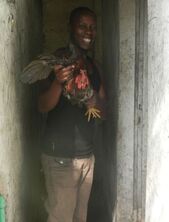 The chicken being prepared for lunch (picture taken on my first trip )
The chicken being prepared for lunch (picture taken on my first trip ) These past few days, I have been appreciating the differences between the Rwandan and American way of life. When I rode to Theophile’s home the first night here, I had an “African Massage.” This isn’t a nice massage from a spa but rather the bouncing of your body against the seat as the car tries to drive on the extremely bumpy and rough terrain. Then at Theophile’s home, without running water, my shower consists of heating a bucket of water; I then pour cold water into the bucket until the water is the right temperature. I then use a cup to pour this water over my head. There is no continual flow of water, so one hand scrubs and one hand pours.
One aspect of being here that I greatly appreciate is the houseboy. Theophile’s houseboy, Dusenge, makes my meals, cleans the bathroom and floor, runs errands, and provides anything else I may need. Having a houseboy or housegirl in Rwanda is very affordable for a middle class or upper class family, as the cost of labor is very low. These are normally younger men and women who will serve for a few years and then continue onto a different career in the future. And then, we have the fresh food here that far exceeds the produce and frozen meat we have in the United States. On Saturday, as I sat on the porch, I watched Dusenge come back from the market with a live chicken he was carrying by its feet; not more than two hours later, that chicken was sitting on my plate ready to be enjoyed. The bananas here are delicious as they were picked when they were yellow and ripe, not when green to be shipped overseas.
As I join in on the Rwandan way of life again, I am reminded that happiness is not reserved for those in developed countries, that joy is not found in having running water, paved roads, or even a houseboy, or fresh chicken. I plan to write more about the nature of poverty in the days to come, but for now I will say that even in less than ideal conditions here, I sense a beautiful side of life that is often missed in our non-stop, iPhone-centered, individualistic culture. We have much to learn and gain from our brothers and sisters in Rwanda and throughout the world.
Alison
 RSS Feed
RSS Feed